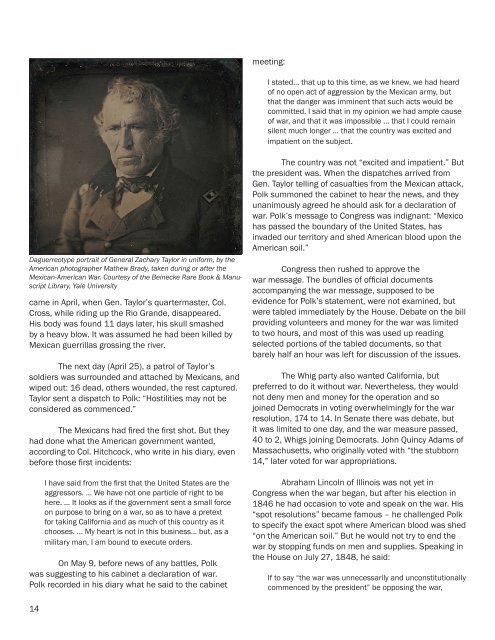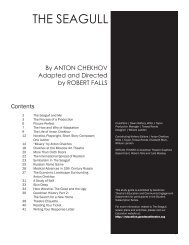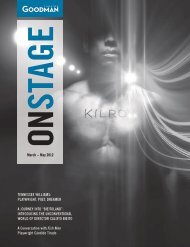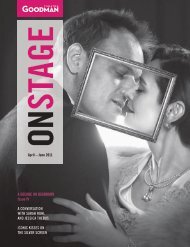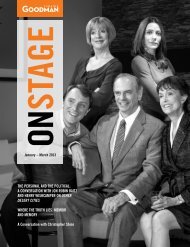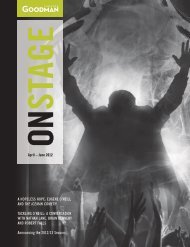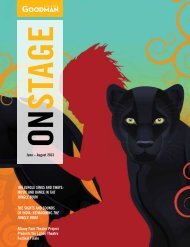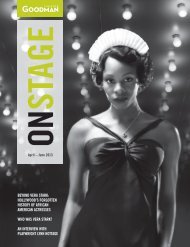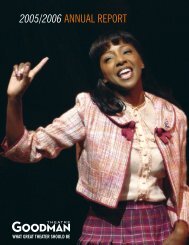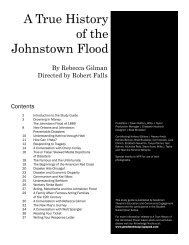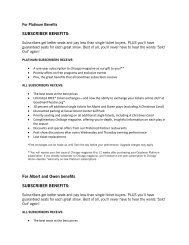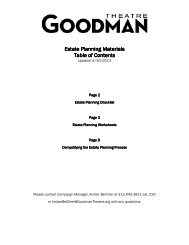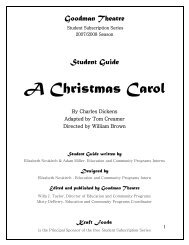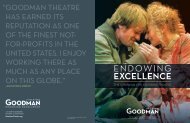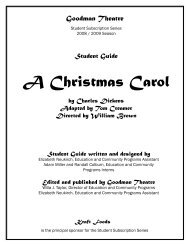El Nogalar Study Guide (9MB) - Goodman Theatre
El Nogalar Study Guide (9MB) - Goodman Theatre
El Nogalar Study Guide (9MB) - Goodman Theatre
You also want an ePaper? Increase the reach of your titles
YUMPU automatically turns print PDFs into web optimized ePapers that Google loves.
meeting:<br />
I stated… that up to this time, as we knew, we had heard<br />
of no open act of aggression by the Mexican army, but<br />
that the danger was imminent that such acts would be<br />
committed. I said that in my opinion we had ample cause<br />
of war, and that it was impossible … that I could remain<br />
silent much longer … that the country was excited and<br />
impatient on the subject.<br />
Daguerreotype portrait of General Zachary Taylor in uniform, by the<br />
American photographer Mathew Brady, taken during or after the<br />
Mexican-American War. Courtesy of the Beinecke Rare Book & Manuscript<br />
Library, Yale University<br />
came in April, when Gen. Taylor’s quartermaster, Col.<br />
Cross, while riding up the Rio Grande, disappeared.<br />
His body was found 11 days later, his skull smashed<br />
by a heavy blow. It was assumed he had been killed by<br />
Mexican guerrillas grossing the river.<br />
The next day (April 25), a patrol of Taylor’s<br />
soldiers was surrounded and attached by Mexicans, and<br />
wiped out: 16 dead, others wounded, the rest captured.<br />
Taylor sent a dispatch to Polk: “Hostilities may not be<br />
considered as commenced.”<br />
The Mexicans had fired the first shot. But they<br />
had done what the American government wanted,<br />
according to Col. Hitchcock, who write in his diary, even<br />
before those first incidents:<br />
I have said from the first that the United States are the<br />
aggressors. … We have not one particle of right to be<br />
here. … It looks as if the government sent a small force<br />
on purpose to bring on a war, so as to have a pretext<br />
for taking California and as much of this country as it<br />
chooses. … My heart is not in this business… but, as a<br />
military man, I am bound to execute orders.<br />
On May 9, before news of any battles, Polk<br />
was suggesting to his cabinet a declaration of war.<br />
Polk recorded in his diary what he said to the cabinet<br />
The country was not “excited and impatient.” But<br />
the president was. When the dispatches arrived from<br />
Gen. Taylor telling of casualties from the Mexican attack,<br />
Polk summoned the cabinet to hear the news, and they<br />
unanimously agreed he should ask for a declaration of<br />
war. Polk’s message to Congress was indignant: “Mexico<br />
has passed the boundary of the United States, has<br />
invaded our territory and shed American blood upon the<br />
American soil.”<br />
Congress then rushed to approve the<br />
war message. The bundles of official documents<br />
accompanying the war message, supposed to be<br />
evidence for Polk’s statement, were not examined, but<br />
were tabled immediately by the House. Debate on the bill<br />
providing volunteers and money for the war was limited<br />
to two hours, and most of this was used up reading<br />
selected portions of the tabled documents, so that<br />
barely half an hour was left for discussion of the issues.<br />
The Whig party also wanted California, but<br />
preferred to do it without war. Nevertheless, they would<br />
not deny men and money for the operation and so<br />
joined Democrats in voting overwhelmingly for the war<br />
resolution, 174 to 14. In Senate there was debate, but<br />
it was limited to one day, and the war measure passed,<br />
40 to 2, Whigs joining Democrats. John Quincy Adams of<br />
Massachusetts, who originally voted with “the stubborn<br />
14,” later voted for war appropriations.<br />
Abraham Lincoln of Illinois was not yet in<br />
Congress when the war began, but after his election in<br />
1846 he had occasion to vote and speak on the war. His<br />
“spot resolutions” became famous – he challenged Polk<br />
to specify the exact spot where American blood was shed<br />
“on the American soil.” But he would not try to end the<br />
war by stopping funds on men and supplies. Speaking in<br />
the House on July 27, 1848, he said:<br />
If to say “the war was unnecessarily and unconstitutionally<br />
commenced by the president” be opposing the war,<br />
14<br />
<strong>El</strong><strong>Nogalar</strong>.indd 14<br />
3/25/2011 4:05:37 PM


